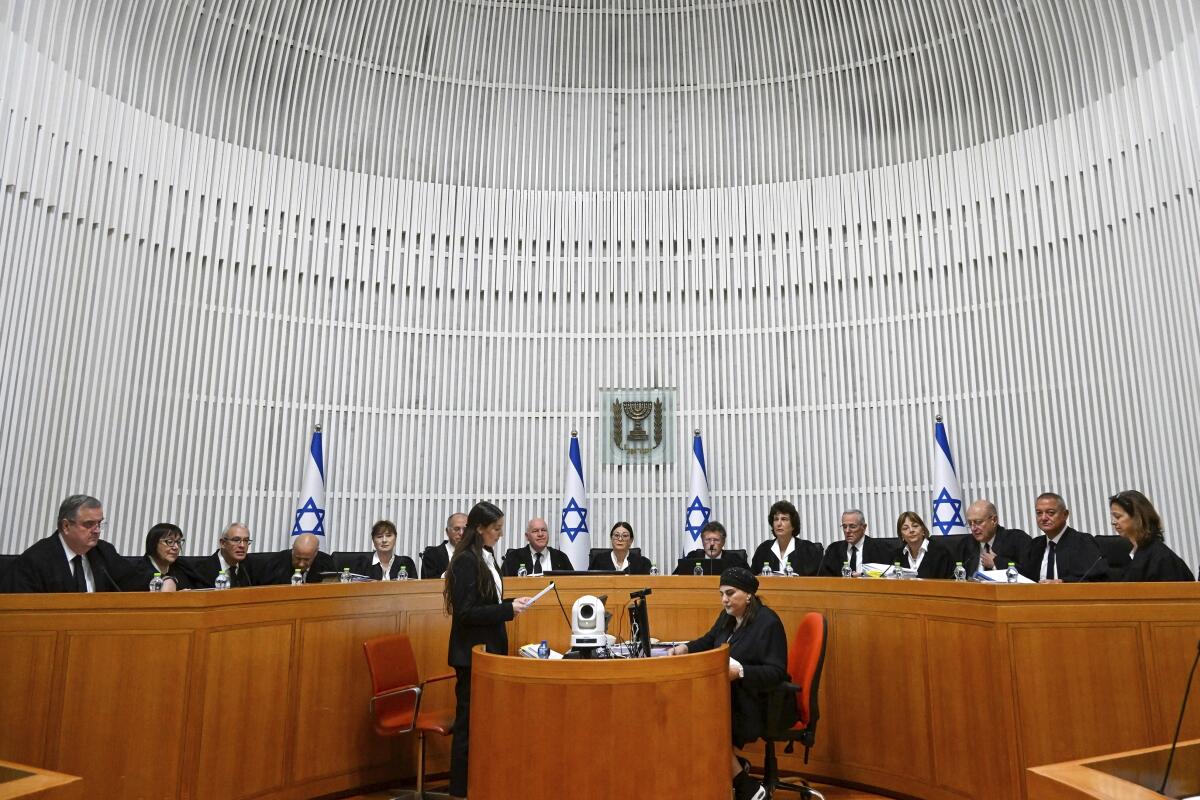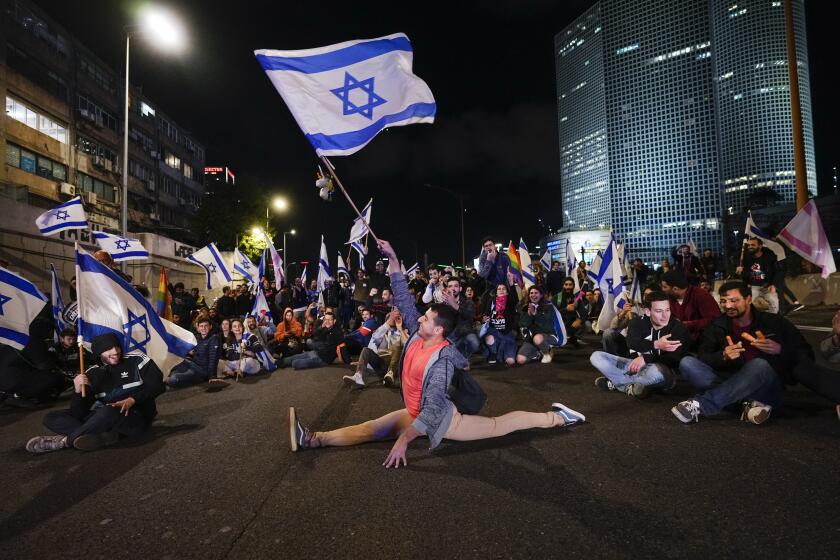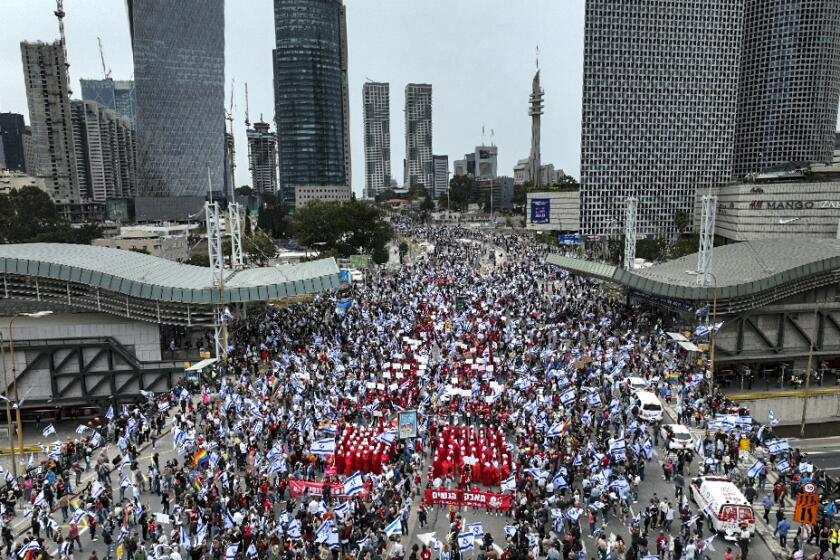Israeli Supreme Court hears first challenge to Netanyahu’s contentious judicial overhaul

- Share via
JERUSALEM — Israel’s Supreme Court on Tuesday opened the first case to look at the legality of Prime Minister Benjamin Netanyahu’s contentious judicial overhaul — deepening a showdown with the far-right government that has bitterly divided the nation and put it on the brink of a constitutional crisis.
In a sign of the case’s significance, all 15 of the court’s justices are examining it together, the first time a full complement has assembled in Israel’s history. A regular panel is made up of three justices, though they sometimes sit on expanded panels. The proceedings are also being livestreamed.
“It’s a historic day,” said Suzie Navot, vice president of the Israel Democracy Institute, a Jerusalem think tank that has been critical of the overhaul. “This is the first time we’ve had this kind of hearing.”
Netanyahu’s coalition, a collection of ultranationalist and ultra-religious lawmakers, launched the overhaul early this year after taking office. Proponents of the plan say the country’s unelected judiciary, led by the Supreme Court, wields too much power.
Critics say the plan to weaken the court removes a key safeguard and will concentrate power in the hands of Netanyahu and his allies.
“We stand here today with millions of citizens to stop the government coup,” said Eliad Shraga, chairman of the Movement for Quality Government in Israel, which filed the petition to strike down the law along with other civil society groups. “Together we will preserve Israeli democracy.”
As Israeli protesters recover from defeat over Netanyahu hard right’s judiciary overhaul, Israel’s economy and high-tech industry reel over fallout.
The hearing puts senior justices in the unprecedented position of deciding whether to accept limits on their own powers. It focuses on the first law passed by parliament in July, a measure that cancels the court’s ability to strike down government moves that it deems “unreasonable.” Judges have used the legal standard in the past to prevent government decisions or appointments seen as unsound or corrupt.
A ruling is not expected for weeks or even months, but the session Tuesday could hint at the court’s direction. The marathon hearing was largely businesslike, though at times the arguments became tense and heated.
In one exchange, Simcha Rothman, a senior government lawmaker who has shepherded the overhaul through parliament, contended that the court could not be trusted to decide its own fate.
“Can you be the ones to judge this without fear, without prejudice, without bias? Because you are dealing with your own honor and status,” Rothman told the chief justice. “And you talk about the Knesset’s conflict of interest?”
Crisis in Israel deepens over the new government’s radical plans, which have alienated and dismayed Israelis and Jewish Americans alike.
Chief Justice Esther Hayut chided him, responding that the court does not deal with its own status but rather “the essential interests of the public.”
In another exchange, Justice Isaac Amit challenged a lawyer representing Netanhayu’s coalition who said the new law doesn’t endanger democracy. “Democracy doesn’t die from a few strong blows. Democracy dies in a series of small steps,” said Amit, who is expected to succeed Hayut as chief justice after she retires later this year.
The judicial overhaul — which opponents characterize as a profound threat to Israeli democracy — has infuriated Israelis across many segments of society. Hundreds of thousands have taken to the streets to march at one protest after another for the last 36 weeks.
The protesters have come largely from the country’s secular middle class. Leading high-tech business figures have threatened to relocate. Perhaps most dramatic, thousands of military reservists have broken with the government and declared their refusal to report for duty over the plan.
Demonstrators blocked highways and gathered elsewhere in the latest nationwide protest against the Israeli government’s planned judicial overhaul.
Netanyahu’s supporters tend to be poorer and more religious, and live in Jewish settlements in the West Bank or outlying rural areas. Many of his supporters are working-class Mizrahi Jews, with roots in Middle Eastern countries, and have expressed hostility toward what they say is an elitist, secular class of Ashkenazi, or Central and Eastern European, Jews.
As the hearing got underway Tuesday, a couple of dozen right-wing activists came out to protest at the entrance to the Supreme Court. “The people are the sovereign!” they shouted through megaphones, blowing horns and holding signs declaring that they had voted for Netanyahu, not Chief Justice Hayut.
The night before, tens of thousands of people protesting the judicial overhaul had flooded the streets near the court, waving national flags and making pro-democracy chants.
The law passed as an amendment to what in Israel is known as a Basic Law, a special piece of legislation that serves as a sort of constitution, which the nation does not have. The court has never struck down a Basic Law before but says it has the right to do so. The government says it does not.
Israel’s parliament has passed the first of several laws proposed as part of a contentious judicial overhaul that has sparked massive public protests.
Israeli Justice Minister Yariv Levin on Tuesday said the court “lacks all authority” to review the law.
“It is a fatal blow to democracy and the status of the Knesset,” he said, insisting that lawmakers elected by the people should have the final say over such legislation.
The attorney general would typically represent the government at such a hearing, but Atty. Gen. Gali Baharav-Miara — a main target of the government coalition’s attacks — has refused to defend the judicial overhaul in court. The sponsors of the law then turned to outside counsel.
The case is at the heart of a wider contest in Israel between fundamentally different interpretations of democracy.
The right wing’s effort to consolidate power has united opposition among hundreds of thousands of Israelis. The occasion is unfortunate, but the potential is great.
Netanyahu and his coalition say that, as elected representatives, they have a democratic mandate to govern without being hobbled by the court, which they portray as a bastion of the left-leaning elite.
“Now [the Supreme Court] is likely to decide not only what the constitution means, but what can be in it,” said Eugene Kontorovich of the conservative Jerusalem-based Kohelet Policy Forum. “This eliminates any possible check on the already powerful court.”
Opponents contend that the court is a key check on majority rule in a country with such a weak system of checks and balances — just one house of parliament, a figurehead president and no firm, written constitution. They say that without the judiciary’s power to review and overturn some government decisions, Netanyahu’s government could appoint convicted cronies to Cabinet posts, roll back rights for women and minorities, and annex the occupied West Bank.
Breaking News
Get breaking news, investigations, analysis and more signature journalism from the Los Angeles Times in your inbox.
You may occasionally receive promotional content from the Los Angeles Times.
The political survival of Netanyahu, who returned to power late last year while standing trial on bribery, fraud and breach of trust charges, depends on his hard-line, religiously conservative coalition partners who have threatened to rebel if he scraps the legislation.
Netanyahu has refused to say clearly whether he would respect a decision by the court to strike down the new law. Some members of his coalition, including Levin, have hinted that the government could ignore the court’s decision.
Legal experts warn that could spark a constitutional crisis, where citizens and the security forces are left to decide whose orders to follow — the parliament’s or the court’s — thrusting Israel into uncharted territory.
More to Read
Sign up for Essential California
The most important California stories and recommendations in your inbox every morning.
You may occasionally receive promotional content from the Los Angeles Times.















